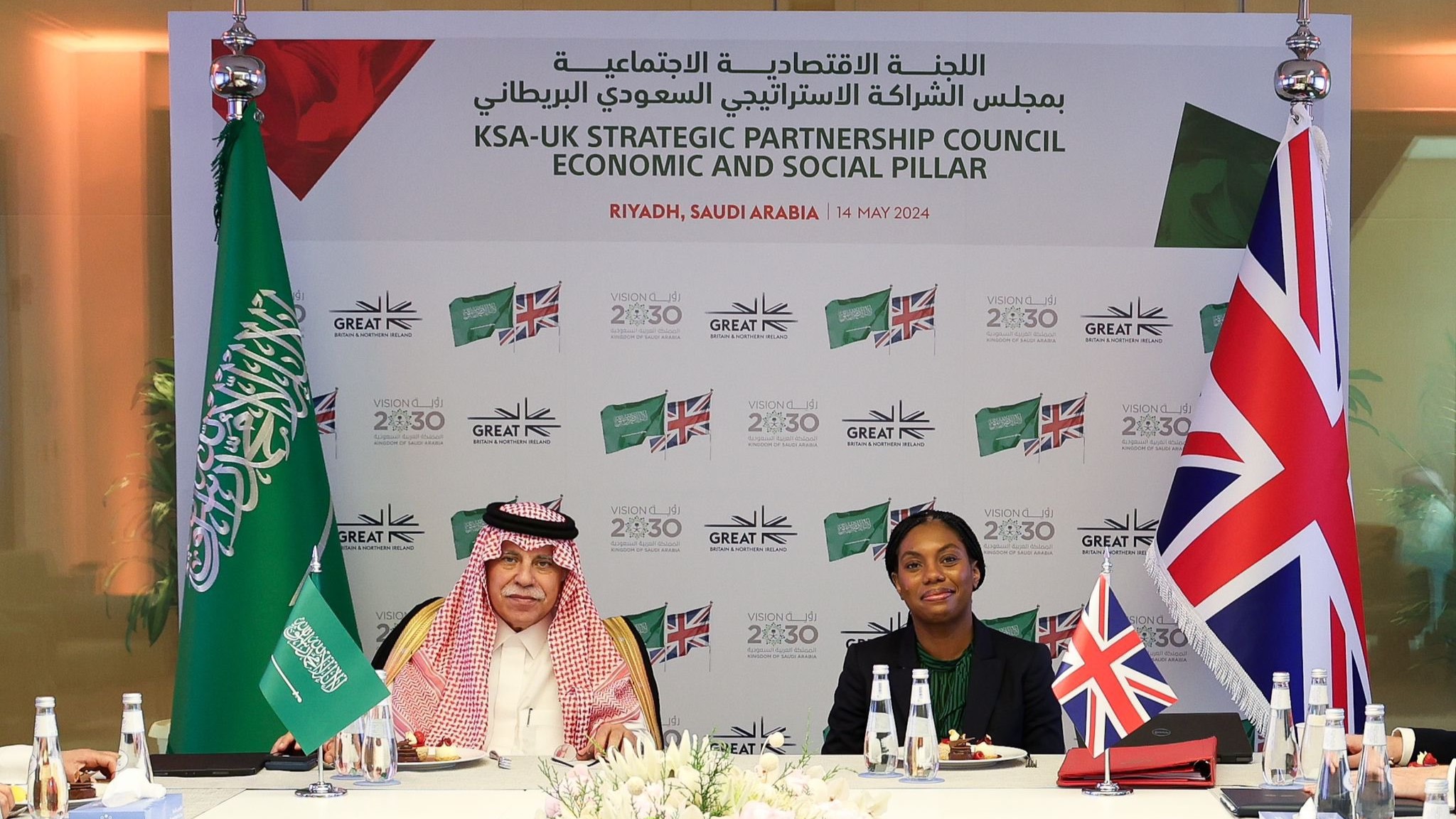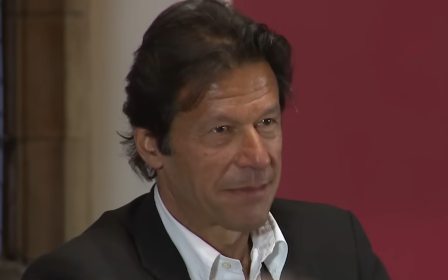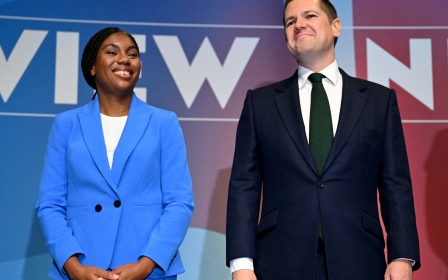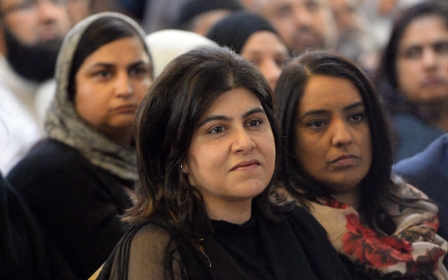Kemi Badenoch: What is the new Conservative Party leader's Middle East policy?

Four months after being booted out of office by British voters, the Conservative Party have elected a new leader.
Kemi Badenoch came to prominence as a key player on the party's hard-right, an unapologetic partisan of the culture wars.
Over the years, she's fashioned herself as a fighter against the influence of "woke" in both British society and (as she saw it) in her own party, while espousing hardline Thatcherite economics.
Taking over from her predecessor Rishi Sunak on Saturday, the first Black woman to lead a major political party in the UK promised to take on the ruling Labour Party and to "reset" the politics of her party in preparation.
When it comes to her approach to foreign policy, the picture is less clear.
New MEE newsletter: Jerusalem Dispatch
Sign up to get the latest insights and analysis on Israel-Palestine, alongside Turkey Unpacked and other MEE newsletters
Her views on the Middle East largely consist of the stridently pro-Israel position that has become almost ubiquitous among right-wing politicians.
Those pro-Israel instincts have been further confirmed by her decision to appoint as foreign secretary Priti Patel, who was forced to resign in 2017 after making unauthorised meetings with Israeli officials.
Middle East Eye takes a look at Kemi Badenoch's record on the Middle East and what we might be able to expect in the future.
Badenoch on Israel
Like most on her wing of politics, Badenoch is firmly pro-Israel and even if she wasn't as garish about it as her rival Robert Jenrick during the leadership election, she has repeatedly played up her support for the country in its wars in Lebanon, Iran and the occupied Palestinian territories.
"I would be congratulating Prime Minister Netanyahu," she told Sky News following the killing of Hezbollah leader Hassan Nasrallah in September.
She said that the country had shown "moral clarity in dealing with its enemies and the enemies of the West" and claimed Nasrallah's death would lead to "more peace in the Middle East".
Ahead of her election as leader, she sent a letter to the Conservative Friends of Israel group saying that if elected she would "continue to strengthen our ties with Israel and root out the tragic resurgence of antisemitism in the UK".
She also warned that Labour was on the verge of "reversing" the strong ties built between the UK and Israel.
Badenoch on Palestine
On the subject of the pro-Palestinian demonstrations that have been taking place at weekends in London and across the UK since the beginning of the war on Gaza in October 2023, she has been equally scathing.
”Our streets were soon filled with hordes of joyous people, not appalled at the acts of terror or demanding the perpetrators be brought to justice, but instead protesting against Jews under the guise of attacking Israel," she wrote in the Daily Mail, alongside denouncing Black Lives Matter and proclaiming that "identity politics does not work".
Badenoch and MENA business
As secretary of state for the Department for Business and Trade, Badenoch was tasked with trying to boost trade for post-Brexit Britain.
As a fervent supporter of the UK leaving the European Union, she has been keen to try and talk up the benefits of Brexit and the new opportunities for international trade that it has supposedly generated.
Last month, during a leadership debate, she said the UK was “too scared to take advantage of the opportunities Brexit has presented”.
In January she flew to Istanbul to discuss an "upgrade" to the existing trade deal between the UK and Turkey, which survived the British exit from the European Customs Union.
"With its major economy and strategic position, Turkey presents huge opportunities for UK businesses," she said at the time.
"And I’m excited to start discussions on ensuring our new trading relationship with Turkey unlocks those opportunities."
Her party having left office since then, she never got the opportunity to follow through on these discussions, however.
She also opened up negotiations with the Gulf Cooperation Council (GCC) on a new free trade agreement with the six-country bloc, describing it as an "enormous opportunity for UK firms".
Separately she also signed in 2023 an agreement with Saudi Arabia on the cultivation of critical minerals.
"The agreement I have signed today with Saudi Arabia will strengthen our partnership on supply chain resilience and industrial cooperation - brilliant news for both our economies," she said at the time.
Badenoch and immigration
Another area where Badenoch has taken a hard line is on immigration, seemingly following in the tradition of her partial namesake, former Conservative MP Enoch Powell.
Criticising another popular target of the Conservative Party, civil servants, she said too many of those worked in the Home Office wanted to "look after" refugees and were "squeamish" about enforcing the UK's borders.
"They are not bad people, but it is not what they came in to do," she told supporters in September.
“Look at many of the officials I met from the Home Office, for example, they had come from refugee charities, they wanted to look after refugees and asylum seekers.”
Starting with her maiden speech to parliament in 2017, she has also been keen to tear down attitudes towards race in the UK which she said demonise white people and undermine aspirational members of ethnic minorities through a "victimhood" mentality.
Badenoch has said that misuse of the Equality Act has led to divisions between communities and led to different treatment of different "factions" of society.
She also leant into the "two-tier policing" conspiracy theory popular with the far right, which claims that the police show greater leniency towards protests by leftists and ethnic minorities and was criticised for suggesting a lack of "integration" had in part sparked off far-right riots in August.
In an interview in September, she blamed "recent immigrants" for the stoking of anti-Israel attitudes in the UK - while adding that she didn't believe that all cultures were "equally valid".
Laura Kuenssberg, "When you say recent immigrants who hate Israel, who do you mean?"
— Farrukh (@implausibleblog) September 29, 2024
Kemi Badenoch, "You want me to say muslims, but it isn't all muslims.. I'm not going to do that, I'm not going to play this game.. I should be able to say that I have made an observation without… pic.twitter.com/n0rtBZyAtC
She warned in an article in the Telegraph that immigrants did not “automatically abandon [their] ancestral ethnic hostilities at the border” as “their feet may be in the UK, but their heads and hearts are still back in their country of origin."
When pushed on what cultures she was referring to by the BBC's Laura Kuenssberg, things turned heated.
"When you say recent immigrants who hate Israel, who do you mean?" asked Kuenssberg.
"You want me to say Muslims, but it isn't all Muslims.. I'm not going to do that, I'm not going to play this game...I should be able to say that I have made an observation without you saying that I'm attacking a particular group," said Badenoch.
When pushed further, she continued to protest that Kuenssberg was trying to twist her words, something she claims to regularly fall foul of.
"I've told you. Things that people write. People I've met. People ripping down posters, we saw who was doing it, we read about cases," said Badenoch.
"I have answered the question multiple times...but I know what you're trying to get me to say."
Middle East Eye delivers independent and unrivalled coverage and analysis of the Middle East, North Africa and beyond. To learn more about republishing this content and the associated fees, please fill out this form. More about MEE can be found here.






